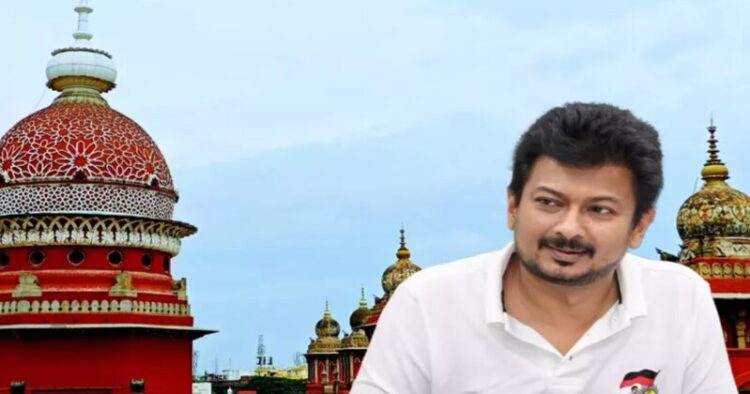The Madras High Court delivered a rebuke to Tamil Nadu Youth and Sports Development Minister Udhayanidhi Stalin, Hindu Religious and Charitable Endowments Minister PK Sekarbabu, and MP A Raja for their comments on Sanatana Dharma, terming them as “perverse and divisive.” However, the court, headed by Judge Anita Sumanth, dismissed the Quo Warranto petitions filed against them, emphasizing the need for constitutional decorum.
The controversy erupted when Udhayanidhi Stalin, speaking at a Tamil Nadu Progressive Writers and Artists Association event in Chennai last September, likened Sanatana Dharma to diseases, stating, “few things cannot be opposed, that should be abolished only. We can’t oppose Dengue, Mosquitoes, Malaria, or Corona, we have to eradicate them. That’s how we have to eradicate Sanatana.” The inflammatory remarks drew nationwide condemnation, resulting in FIRs filed across the country against the minister.
Chennai-based advocate B. Jagannath approached the Supreme Court with a petition, challenging Udhayanidhi Stalin’s comments. Hindu Munnani office-bearers T Manohar, J Kishore Kumar, and VP Jayakumar filed three writ petitions, questioning under what authority the individuals hold public posts. The petitions, known as Quo Warranto petitions, sought clarification on the legitimacy of Udhayanidhi Stalin, Minister P.K. Sekar Babu, and DMK MP A. Raja holding public positions.
After months of anticipation, Judge Anita Sumanth announced the verdict on March 6, stating that the comments made by Udhayanidhi Stalin, Sekarbabu, and A. Raja equating Sanatana Dharma to diseases were “perverse, divisive, and contrary to Constitutional principles.” The court delivered critical remarks, highlighting that those in constitutional positions should refrain from making statements that could sow division and misinformation.
While rebuking the ministers for their controversial remarks, the Madras High Court decided not to entertain the Quo Warranto petitions filed against Udhayanidhi Stalin, Sekar Babu, and A. Raja. The court emphasised the importance of upholding constitutional decorum and principles, acknowledging that the ministers’ statements were objectionable but stopping short of removing them from their respective positions.
The court’s decision is likely to have broader implications on the accountability of public figures and the boundaries of free speech, especially when holding constitutional positions. While the ministers face criticism for their statements, the legal proceedings have underscored the importance of balancing free expression with the responsibility that comes with holding public office.
Judge Anita Sumanth, who delivered the verdict, emphasised the importance of constructive criticism among individuals holding power, stating, “The differences are expected to be based on a thorough understanding of the system being critiqued, and importantly, such criticism must be constructive and not destructive.” The court underscored that statements made by sitting Ministers must be factually accurate, and those in power must adhere to the moral values propagated by the constitution.
The judgement specifically criticised HR and CE Minister Sekar Babu for participating in a meeting advocating the eradication of Sanatana Dharma. While acknowledging the maintainability of the writs filed by Hindu Munnani functionaries, the court deemed the pleas premature, highlighting that no disqualifying actions had been taken against the Ministers and MP.
Judge Anita Sumanth clarified that the relief sought by the writ petitioners was premature, given the pending multiple First Information Reports (FIRs) related to the Sanatan Dharma row. The court reasoned that the writs of Quo Warranto could not be issued at the present stage as no legal actions leading to disqualification had been taken against Udhayanidhi Stalin. The absence of convictions further contributed to the dismissal of the pleas.
In a separate development, Justice Dipankar Datta of the Supreme Court questioned Udhayanidhi Stalin about his exercise of Article 32 rights, cautioning him about the consequences of his statements. The judge pointed out the potential abuse of constitutional rights and the need for responsible discourse.
The Madras High Court’s verdict and the Supreme Court’s scrutiny underscore the delicate balance between freedom of expression and the responsibilities associated with holding public office. The dismissal of Quo Warranto petitions indicates that legal action may follow pending investigations, emphasising the importance of due process in resolving the Sanatana Dharma controversy.
The judicial rebuke serves as a reminder of the constitutional responsibilities of those in power, while the dismissal of premature pleas suggests that legal proceedings may unfold as FIRs progress through the investigative process.




















Comments